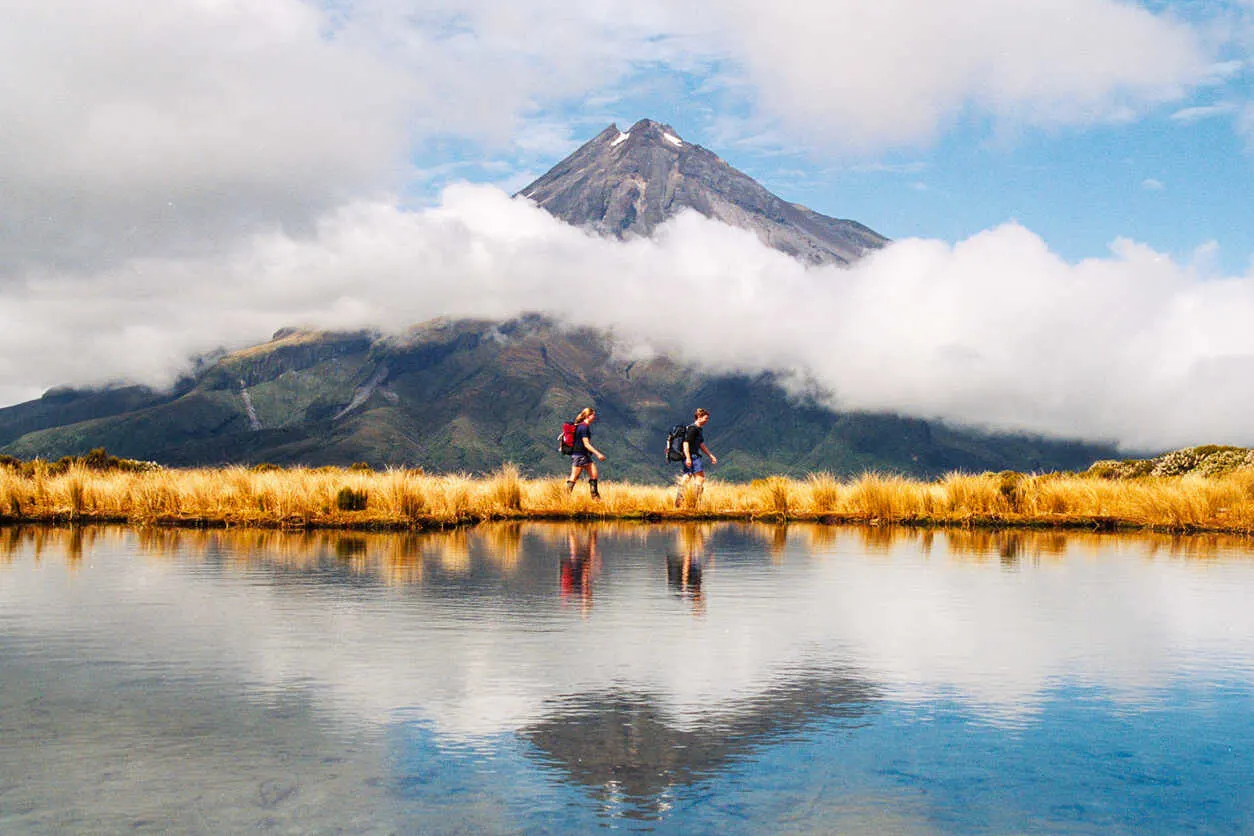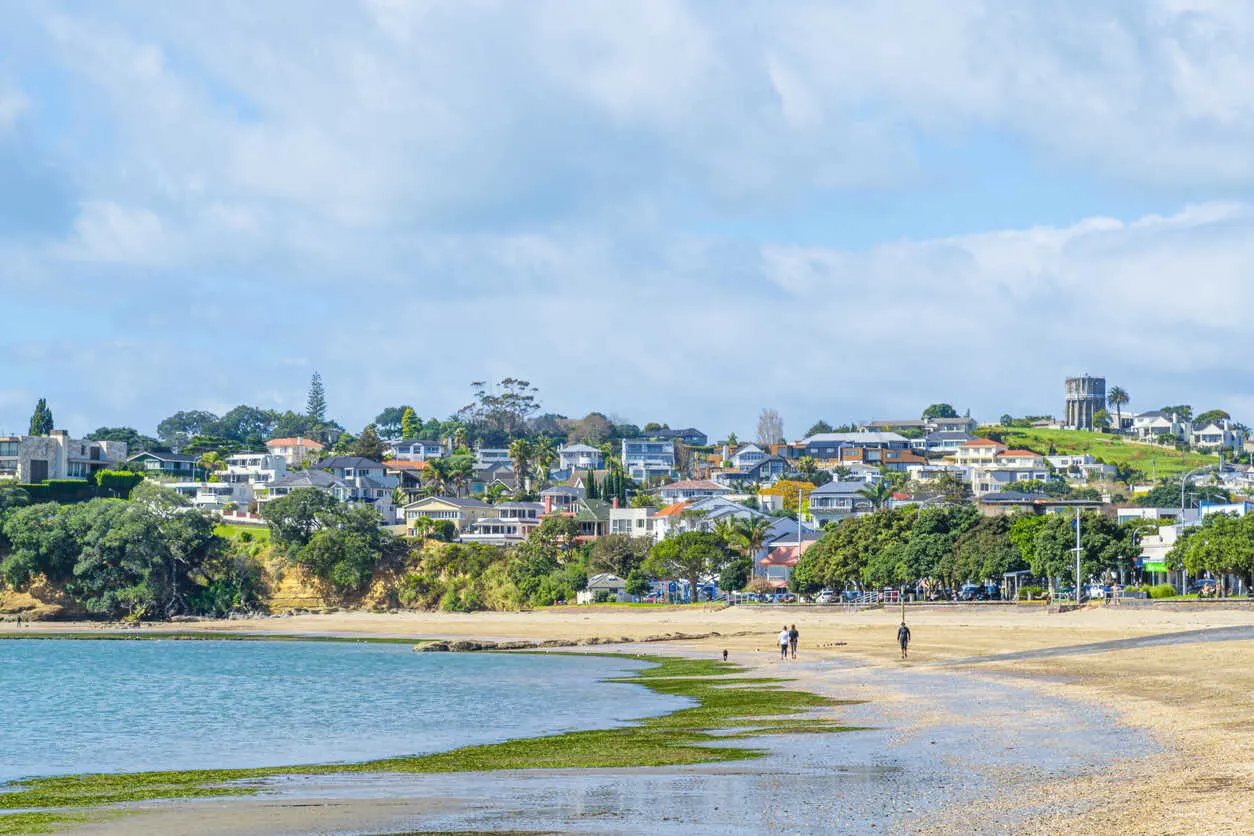My husband has a saying, ‘Kiwis love to go out into the world, capture their prey, and drag them home,’" says Aaron Jones. "That’s basically what happened to me."
Aaron and I are sitting at a popular pub on St. Heliers Beach, an upscale Auckland, New Zealand suburb. As the former US Refugee program worker shares his story, he snacks on Kiwi favorites: fish ‘n’ chips and pork bellies.
Aaron met his husband, Auckland native Seb, on a trip to Australia. They kicked off a whirlwind romance at Mardi Gras, Oceania’s largest Pride event, and Aaron decided to take the plunge and move overseas.
"I didn’t want to be 60 and regret I didn’t do it sooner," Aaron shares.
Now in his 40s, he’s settled in nicely to Auckland life—particularly its outdoorsiness. He’s a fan of "tramping," a New Zealand term for long-distance hiking through rough country. "It’s a wonderful tradition in New Zealand, and incredibly safe," he explains. "There are a lot of well-maintained conservation huts along the route, as well as luxury options. There are moments while hiking when I stop and think I’m living in a movie set."
YOUR CHANCE TO RETIRE OVERSEAS NOW
YOUR CHANCE TO RETIRE OVERSEAS NOW
Sign up for our free daily IL Postcards e-letter and we'll immediately send you a free report on the WORLD'S #1 RETIREMENT HAVEN—plus 9 more of the most desirable and very affordable destinations where you can upgrade your retirement right now. Each day you'll learn about the best places to retire, travel, buy real estate and enjoy life overseas.
By submitting your email address, you will receive a free subscription to IL Postcards, Overseas Dream Home, The Untourist Daily and special offers from International Living and our affiliates. You can unsubscribe at any time, and we encourage you to read more about our Privacy Policy.
His other favorite activity: taking photographs at Dark Sky Sanctuaries, the ultimate in stargazing destinations. These offer wide, open vistas free from light pollution, meaning you can see stars, planets, and even galaxies with unparalleled clarity. There are only 17 Dark Sky reserves in the world… and New Zealand is home to five of them. "I love the country’s focus on preserving nature," Aaron says.
Sure, New Zealand is beautiful. But what about the country’s isolation?
New Zealand’s a minimum of 13 hours from the West Coast of the US, so that impacts your ability to get back in a hurry. And travel to other parts of the world is also quite far… and expensive. Aaron and Seb are three hours from the Australian East Coast, but still eight hours from Singapore, 10 from Japan, 14 from Dubai.

But Aaron says it’s completely worth it. "The country packs a lot of diversity into a small island. The variety of the world can be experienced in New Zealand, from deserts and sand dunes to glaciers and palm trees, NZ has a piece of everything."
"You Could Live on $2,100 a Month"
Today, Aaron and Seb own a three-bed, two-bath house near central Auckland. They paid over NZ$2 million ($1.2 million). The average home in Auckland—the country’s most expensive city—runs NZ$930k or $558k.
But in other bustling cities like Wellington, Christchurch, and Queenstown, you’ll find lower prices in the NZ$700k-800k ($420k-480k) range.
"You could probably live on NZ$3,500 a month ($2,100) in most places," Aaron says, "but in Auckland a more comfortable monthly budget would be NZ$5,000 ($3,000), including housing costs."
New Zealand offers both public and private healthcare options, all of which Aaron says are wonderful. "I have insurance in addition to standard healthcare in NZ," he says. "I pay a little over $100 a month for myself. The healthcare here is fast and highly professional, and more responsive than in the US."
"From deserts to glaciers, New Zealand has everything."
Aaron reports that work-life balance is solidly in favor of "life" here, too. It’s a progressive country, he says—on every subject from the environment to the LGBTQ community. "I’ve never felt unsafe as a gay man in New Zealand, urban or rural. My husband and I are open with our relationship, and I have not encountered any discrimination in a professional or social setting."
When I ask about returning to life in the US, Aaron gives the suggestion a hard no. "I am never going back," he says.
Is it Hard to Get Residency in New Zealand?

Americans and citizens of other friendly countries are allowed to remain in New Zealand on tourist visas for up to nine months at a time. (You can only get one such visa in any 18 month period, however, so you’d have to spend at least nine months out of the country before coming back a second time.)
Australia and New Zealand also have legal protections and rights for partners in a relationship for longer than a year. After a year, one can apply for the four-year partner visa.
Both countries also have an agreement similar to the EU: You can live and work in the other country without a visa.
Aaron applied for a Partner Work Visa, allowing him to live and work in New Zealand, but says he wishes he’d instead applied for the Partner Residence Visa. This visa is almost identical to the Work Visa—except that the time spent on the residence visa counts toward citizenship.
Once you have the partner residence visa for two years, you can apply for permanent residence. After five years of permanent residency, you can apply for citizenship—which Aaron’s now doing.
If you don’t have a New Zealand partner or family member, it’s difficult to immigrate. IL’s chief diversification expert, Ted Baumann, reports that New Zealand has no retirement, independent means, or digital nomad visas. Under the recently-elected conservative government, there are plans to restrict immigration even further.
It’s possible to get a long-term residency permit as an investor… but the minimum investments start at NZ$5 million ($3 million). The bulk of New Zealand immigration permits go to skilled workers.
On the other hand, parents and grandparents of New Zealand residents can apply for family reunification visas. This allows you to live and work in New Zealand, but your children must agree to sponsor you and assume responsibility for all of your living and healthcare costs.
YOUR CHANCE TO RETIRE OVERSEAS NOW
YOUR CHANCE TO RETIRE OVERSEAS NOW
Sign up for our free daily IL Postcards e-letter and we'll immediately send you a free report on the WORLD'S #1 RETIREMENT HAVEN—plus 9 more of the most desirable and very affordable destinations where you can upgrade your retirement right now. Each day you'll learn about the best places to retire, travel, buy real estate and enjoy life overseas.
By submitting your email address, you will receive a free subscription to IL Postcards, Overseas Dream Home, The Untourist Daily and special offers from International Living and our affiliates. You can unsubscribe at any time, and we encourage you to read more about our Privacy Policy.
